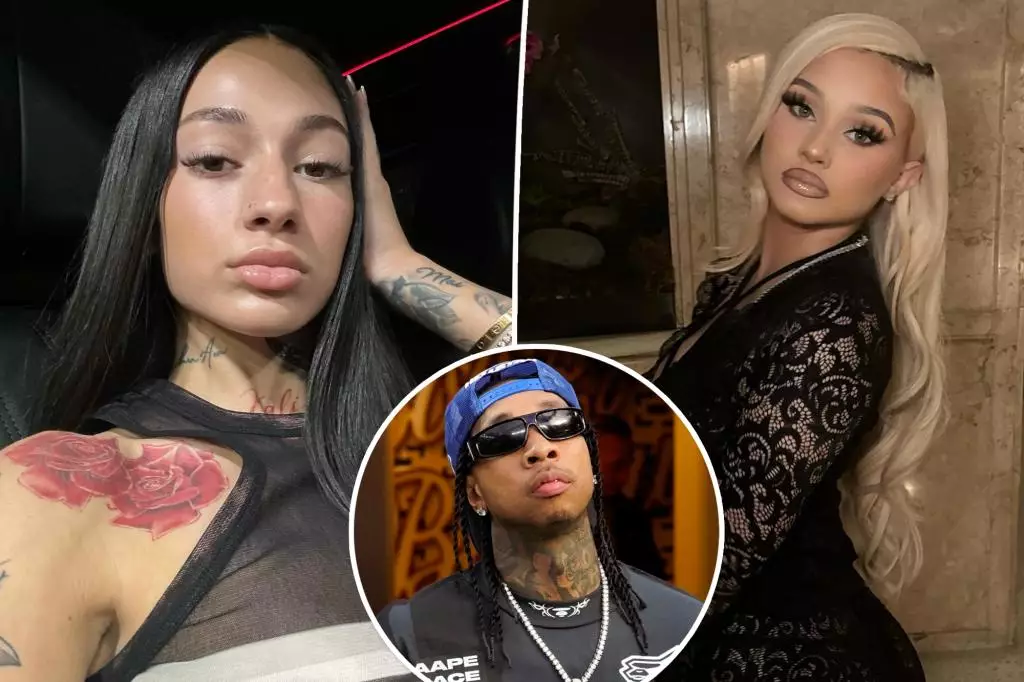In the world of social media and celebrity antics, drama rarely stays under wraps for long. The recent feud between Bhad Bhabie and Alabama Barker has not only caught public attention but also incited debate about the veracity of claims and the fine line between rumor and reality. The rising tension began when Alabama Barker, daughter of musician Travis Barker, was accused by Bhad Bhabie—whose real name is Danielle Bregoli—of having questionable connections with entertainment figures including Tyga and Soulja Boy. These allegations have been fueled by Bhabie’s passionate diss track, “Over Cooked,” which has set the stage for a public row that exemplifies the trials of celebrity culture.
Bhabie’s song, “Over Cooked,” dives deep into her grievances with Alabama, alleging that the young influencer tried to manipulate her relationship with her boyfriend, Le Vaughn. The lyrics underscore a sense of betrayal and anger, with Bhabie stating that Alabama tried to “steal” her baby daddy, alongside insinuations about Alabama’s supposed entanglements with both Tyga and Soulja Boy. Such strong accusations can evoke intense public curiosity and reactions, especially given the prominence of all individuals involved.
In response to these allegations, Alabama took to TikTok to categorically deny the claims. Her statements, “I never in my life have remotely been near Tyga. I’ve also never been pregnant, nor do I know Soulja Boy,” reveal a determination to protect her reputation against unfounded rumors—a crucial move in an age where a celebrity’s image can be instantly tarnished by a single social media post. The direct nature of her responses embeds her stance in clarity, yet it also raises questions about the nature of public discourse in the realm of fame.
Social media has amplified both the spread of the rumors and the responses to them. Platforms like TikTok, Instagram, and YouTube serve not only as personal avenues of expression but also as battlegrounds for public relations strategy, where one misstep can result in significant backlash. Bhad Bhabie’s choice to release a diss track and follow it with graphic public statements illustrates how artists are using their platforms to craft narratives that resonate with a broad audience.
Simultaneously, Alabama’s denial and her announcement of a new song titled “Cry Bhabie” showcase how interpersonal disputes are often commodified in the entertainment industry. The release of music in such contexts transcends mere artistic output; it becomes a method of reclaiming agency and voicing a counter-narrative. Here, artistry is closely intertwined with personal survival in the competitive world of celebrity culture.
At the heart of this drama lies the notion of public perception and its implications. The more information circulated—true or not—the more entrenched opinions become, creating an atmosphere where individuals may rush to conclusions. Given their ages, Bhad Bhabie and Alabama are also at a crucial stage in their careers, where public perception is particularly pivotal for their growth trajectories. Thus, this feud doesn’t just involve personal feelings or relationships; it bears significant weight on their respective brands and futures.
Aside from the personal ramifications, this situation invites broader discussions on how young influencers navigate relationships within the public eye. With fans closely following their lives, the line between personal affairs and public persona fades, complicating the management of both.
As both parties continue to assert their narratives, the ultimate resolution remains uncertain. Will this feud provoke further artistic expressions, fueling a cycle of music and rebuttal? Or will it simmer down and gradually fade away from the spotlight? In any case, the ongoing tension between Alabama Barker and Bhad Bhabie serves as a compelling reminder of the intricate dynamics of truth, perception, and the ever-evolving nature of digital fame. Ultimately, this conflict not only reflects individual artistry but is also a shining example of how personal disputes can captivate an audience, driving engagement and speculation in the relentless world of entertainment.
